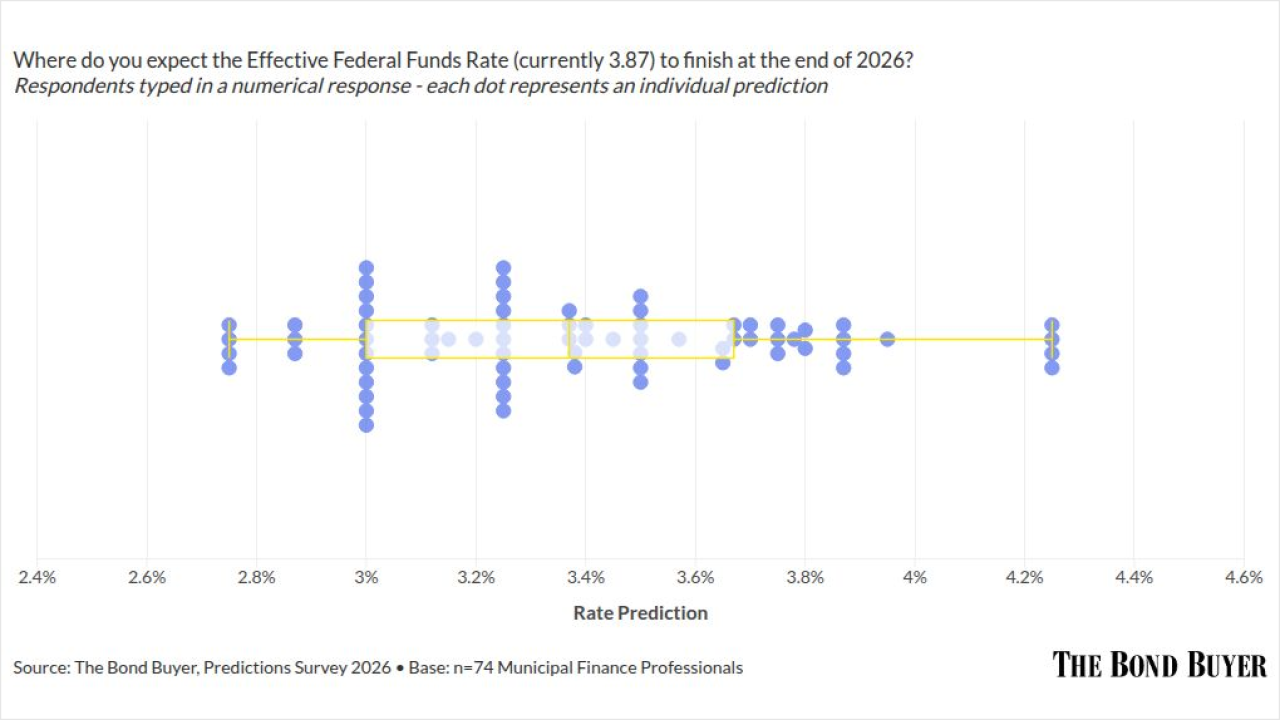The U.S. Department of the Treasury Wednesday afternoon temporarily stoppedselling State and Local Government Series securities - a freeze that will continue untilCongress increases the nation's debt limit, the department announced.
The halt of sales of so-called SLGS, which was expected by observers, is likely to be aninconvenience and drive up municipal bond deal costs in some cases, , but it appearsunlikely to pose a serious financial problem for state and local issuers. SLGS aretailored to meet arbitrage restrictions on the investment of bond proceeds.
Any SLGS subscriptions received prior to the cutoff Wednesday will be issued on therequested issue date. All scheduled payments will be made, according to informationposted on the Web site of the Bureau of Public Debt, which operates the SLGS program.
The closure comes at a time when advance refundings in the municipal market have slowedconsiderably from the pace at which they were being done in the last half of 2002.Issuers sold more than $1 billion in advance refundings per month between May andNovember, including a total of $5.7 billion in September and October, while such salesaccounted for only $90 .8 million of the $23.4 billion in municipal debt issued lastmonth, according to information from Thomson Financial.
Municipal bond market participants involved in upcoming deals said the lack of SLGS willimpact their respective deals in different ways. Raymond S. Kramer Jr., president ofFrankfort, Ky.-based First Kentucky Securities Corp. - which is financial adviser for anupcoming $86.11 million University of Louisville revenue refunding bond deal - said notbeing able to buy SLGS isn't going to make life easy.
"It will drive up our costs because we will have to buy debt on the open market," Kramersaid, adding that he expects the absence of SLGS in the deal will push costs up by atleast 25 basis points. The negotiated deal, which is expected to go to market on Feb.27, will nonetheless proceed, he said. "Most of it is current refunding, so negativecarry is not a big problem," he said.
An official in the Massachusetts state treasurer's office said that the state is notplanning to buy SLGS with the proceeds from the $675 million refunding it is planningfor next week as part of a $975 million combined new-money refunding deal. The state isplanning to invest the proceeds in higher-returning agency debt, the official said.
On an unrelated transaction, John Augustine, a managing director with Lehman Brotherswho is lead banker for the Massachusetts State College Building Authority's $230 millionrevenue refunding deal, said he did not expect the closure of the Treasury's SLGS windowwould drive up costs on his deal.
"In our case it does not have a material impact on the cost of the escrow, we just haveto be more creative," Augustine said. "We just have to use treasuries in a differentway: we just go to the open market and buy Treasuries." He declined to be more specificabout his plans. No sale date has been set for the bonds.
Chris Winters, a principal with Winters & Co., a Los Angeles-based escrow bidding agent,had some tips for issuers who want to complete deals while SLGS are unavailable. In aninterview yesterday, he acknowledged that although the most common source of defeasanceescrow securities is temporarily unavailable, advance refundings can still be done.
"Open-market escrows, especially when combined with a float agreement, generally willprovide a yield equal to or greater than SLGS," Winters said. "In order to help assurecompliance with market price rules, the escrow should be purchased through a bidprocess."
Treasury officials have written congressional leaders twice in the last two months,saying a hike in the current $6.4 trillion national debt cap was needed as a result ofthe government's ongoing response to the terrorist attacks of Sept. 11, 2001, and theeconomic slowdown. Treasury Secretary John W. Snow wrote in a letter addressed to HouseSpeaker Dennis J. Hastert, R-Ill., dated Wednesday, that "we must continue workingtogether to enact an increase in the statutory debt limit as quickly as possible toavoid any negative repercussions at home or abroad." Hastert's press secretary did notreturn telephone calls yesterday.
The Treasury Department, which did not specify the size of the increase it is seeking,warned two months ago that it might hit the current debt ceiling by late February.Congress raised the debt limit by $450 billion late last June - some $300 billion lessthan the Bush administration requested - after nearly five months of infighting in whichboth Republicans and Democrats used the debt ceiling hike as a pawn in a game overbigger issues. Democrats blamed the president's 2001 tax cuts for the resurgence of thedeficits, while Republicans charged that Democrats wanted to return to the days of bigspending.
Stephen Moore, a conservative activist here who heads the Club for Growth, said he hopesthat debt-conscious lawmakers use the confrontation over the debt limit as anopportunity to reel in government spending. "Whenever we raise the debt ceiling, weshould extract a pound of flesh out of the big spenders," Moore said.
A group of conservative House Democrats known as the Blue Dog Coalition have promised tooppose any increase in the debt limit that is not combined with a plan to deal withrising deficits.
Johanna Piazza contributed to this article.





